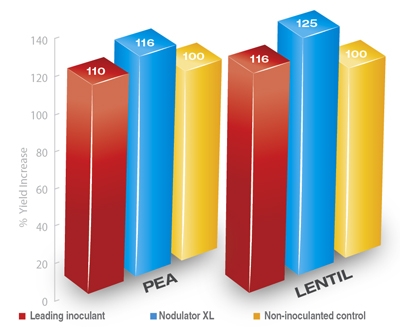
Features
Inoculants
Seed & Chemical
New pulse inoculant raises yield performance
The vast majority of pea and lentil growers use rhizobia inoculants as a standard practice. After all, a small investment in an inoculant can bring large rewards in nitrogen fixation and yield. With the understanding that inoculants are part of the pulse production program, the difficult decision is which inoculant to use. That choice just became easier.
Launched in July 2011, new Nodulator XL inoculant for pea and lentil brings Western Canadian growers an improvement in rhizobia inoculants. With yields up to eight percent higher than leading inoculants, Nodulator XL has the potential to increase revenue by a substantial margin.
“For peas, you are looking at $5 to $15 per acre in added revenue from the higher performance with Nodulator XL, and with lentils, you are looking at a bit more at about $8 to $25 per acre,” says Ralph deVries, director of marketing – canola with Becker Underwood at Cottam, Ontario.
Becker Underwood developed Nodulator XL, and has a long history in pulse inoculants. Nodulator XL replaces its previous Nodulator pea and lentil inoculant. Danielle Fletcher, field agronomist with Becker Underwood, explains that both Nodulator products use the Rhizobium leguminosarum bv. viceae species, but Nodulator XL improves on the strain of that species. The old Nodulator used the P2 strain, whereas Nodulator XL has the 1435 strain.
“Nodulator XL has an improved strain of rhizobia. It is like humans. We are all Homo sapiens, the species, but we are all individuals that do some things better than others. A rhizobial strain can be likened to an individual within the human population,” says Fletcher.
Independent research establishes advantage
Becker Underwood contracts out small plot research to develop data packages for registration. These independent small plot trials form the basis of the Canadian Food Inspection Agency registration. In 171 station-years of research, Nodulator XL increased yields by three to eight percent more than the leading inoculants.
Fletcher explains that Nodulator XL consistently outperformed other products, with higher yield 79 percent of the time in pea and 82 percent of the time in lentil. She says that in side-by-side farmer field trails conducted in 2011, consistency was even higher, with up to 92 percent of the Nodulator XL fields outyielding other inoculants. Growers conducting side-by-side trials saw an average increase of 1.6 bu/ac.
According to Becker Underwood information, the differences first show up in the roots, where Nodulator XL inoculated crops show more vigorous, robust and highly branching roots. Nodules also stay pink longer, indicating increased nitrogen fixation.
Three formulations
Available for the 2012 planting season, Nodulator XL will be available in liquid, self-adhering peat-based and solid core granular formulations. Each formulation can be used on both pea and lentil.
Fletcher says the solid core formulation is an improvement over other types of granular inoculants. The solid core granule is virtually dust-free and is much easier to handle. It is more resistant to crumbling caused by pressure and abrasion. The solid core granule also reduces the caking and flowability problems that peat granules have under higher humidity conditions.
The solid core granule has a reduced application rate compared to the previous Nodulator granular formulation, and is available in 50-pound or 364-kilogram Q-Pak mini-bulk bags.
March 12, 2012 By By Bruce Barker
 New inoculant raises yield performance Nodulator XL averages eight percent higher yield in pea and lentil. Nodulator XL averages eight percent higher yield.
New inoculant raises yield performance Nodulator XL averages eight percent higher yield in pea and lentil. Nodulator XL averages eight percent higher yield.